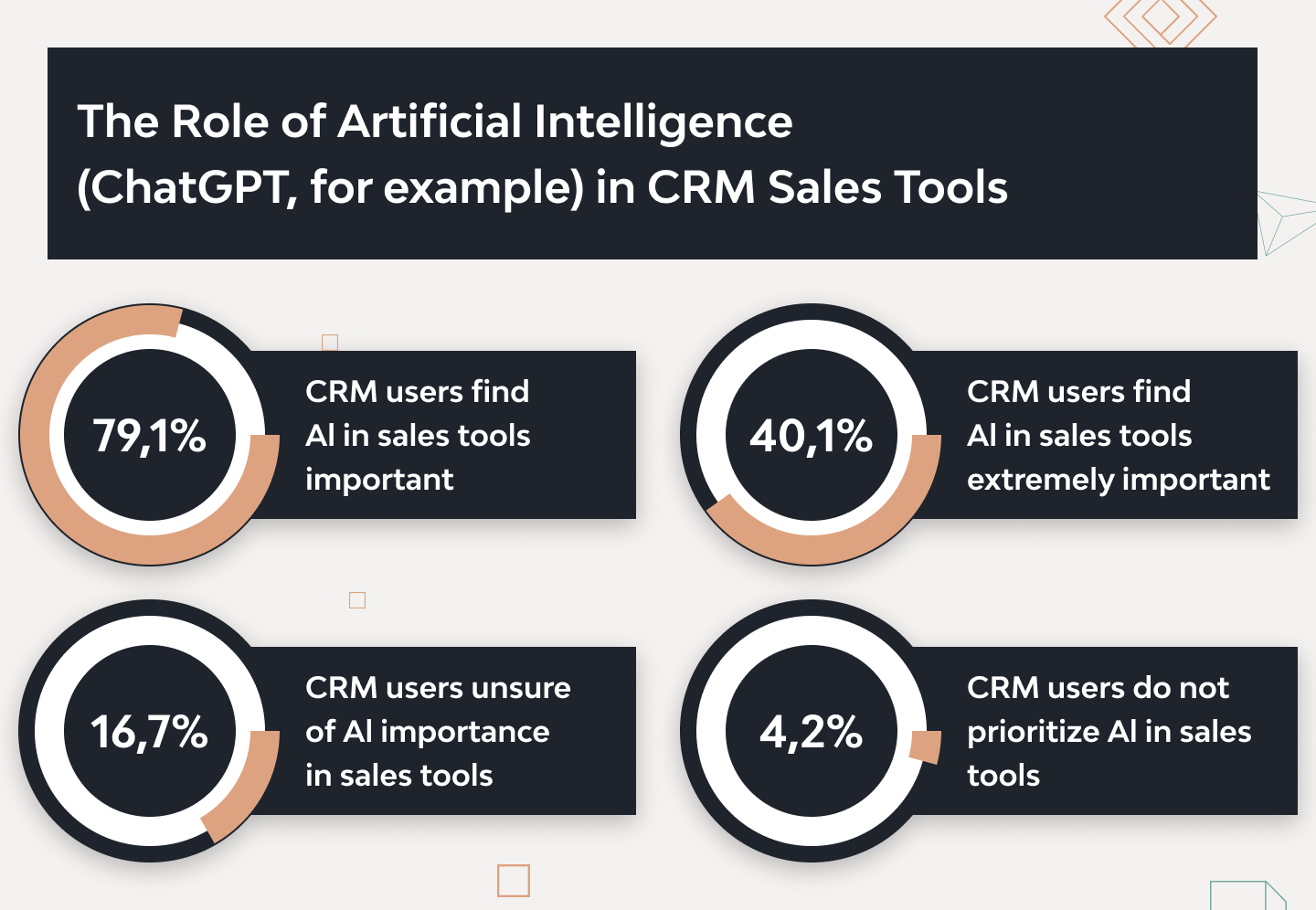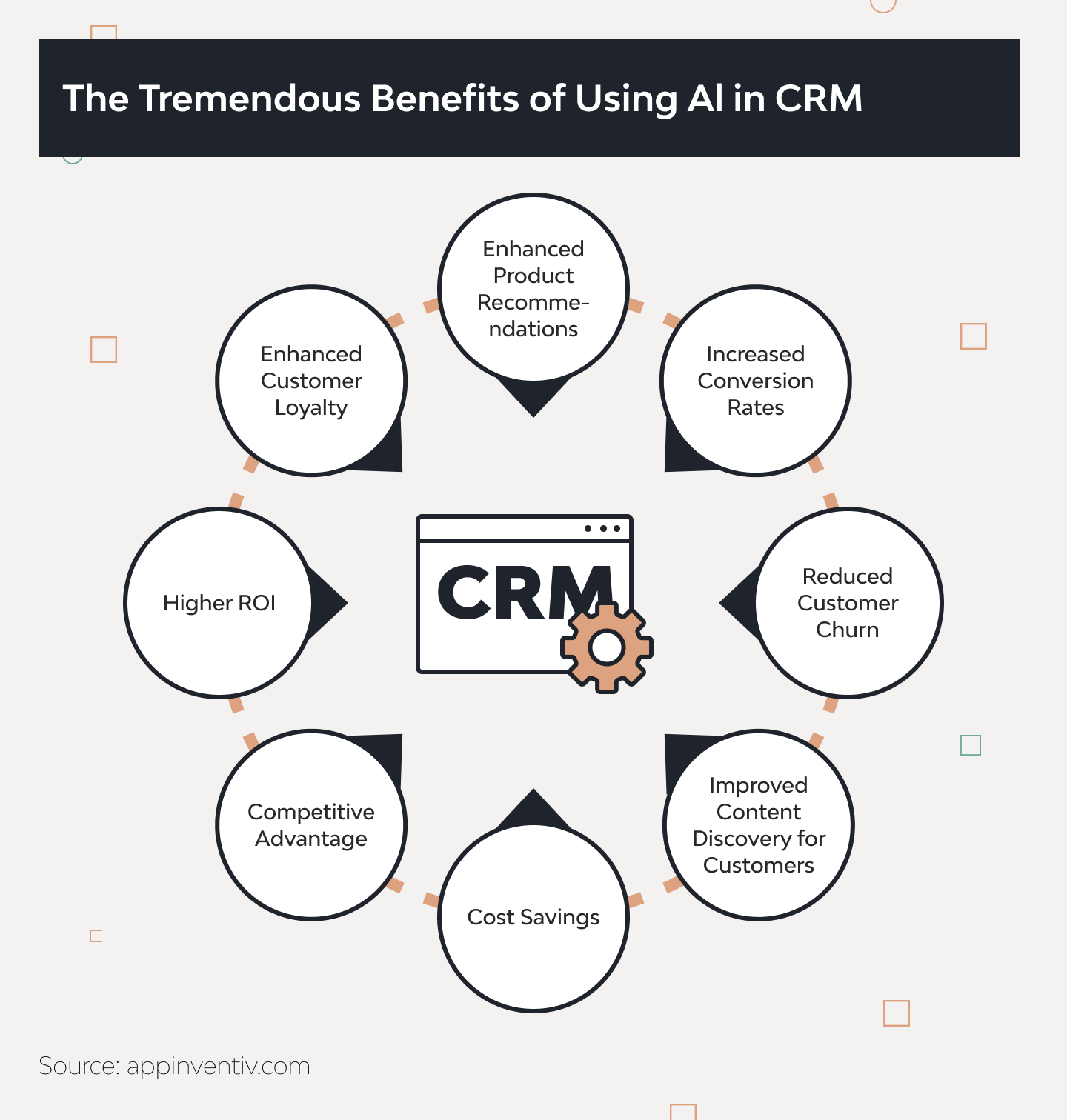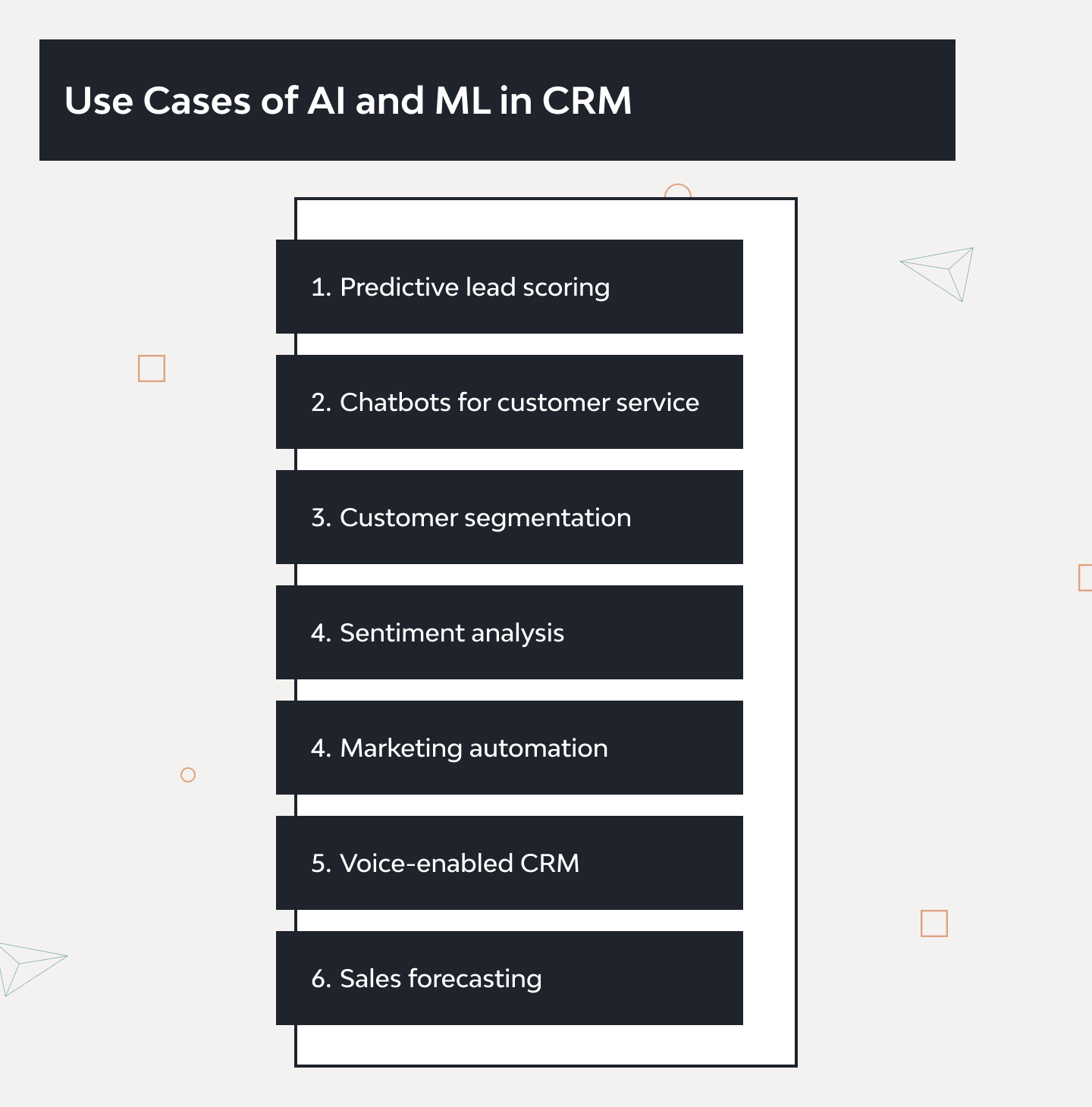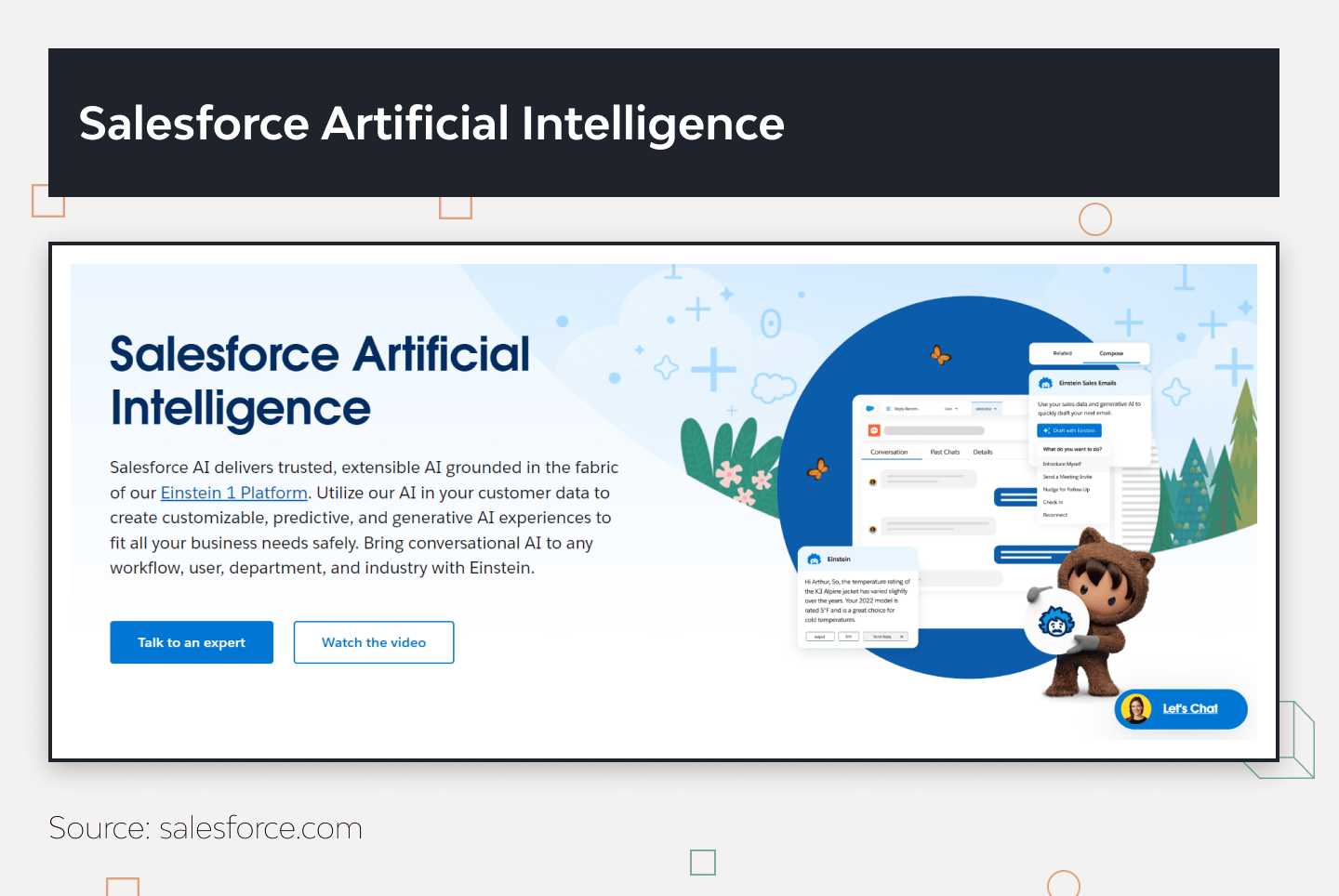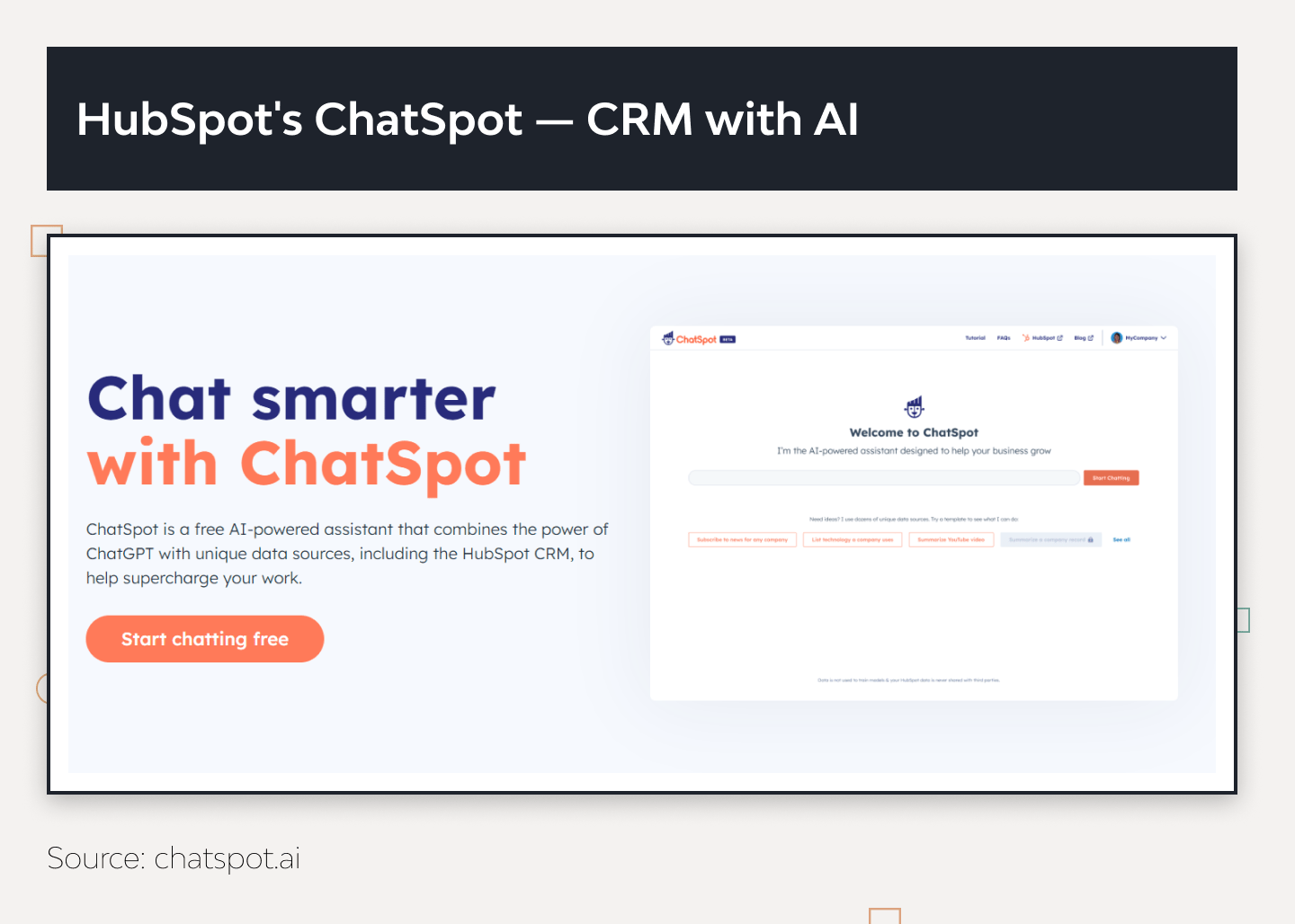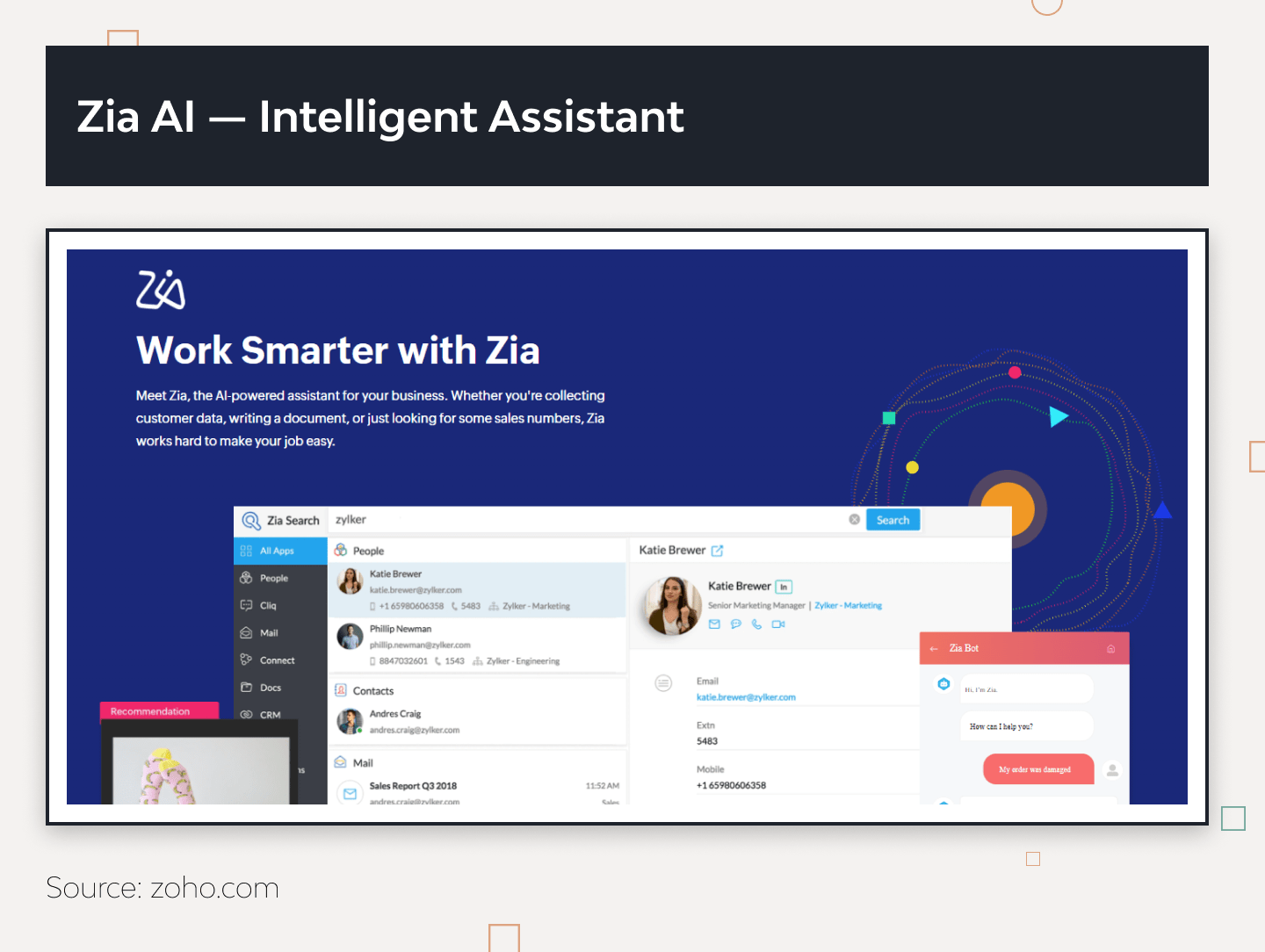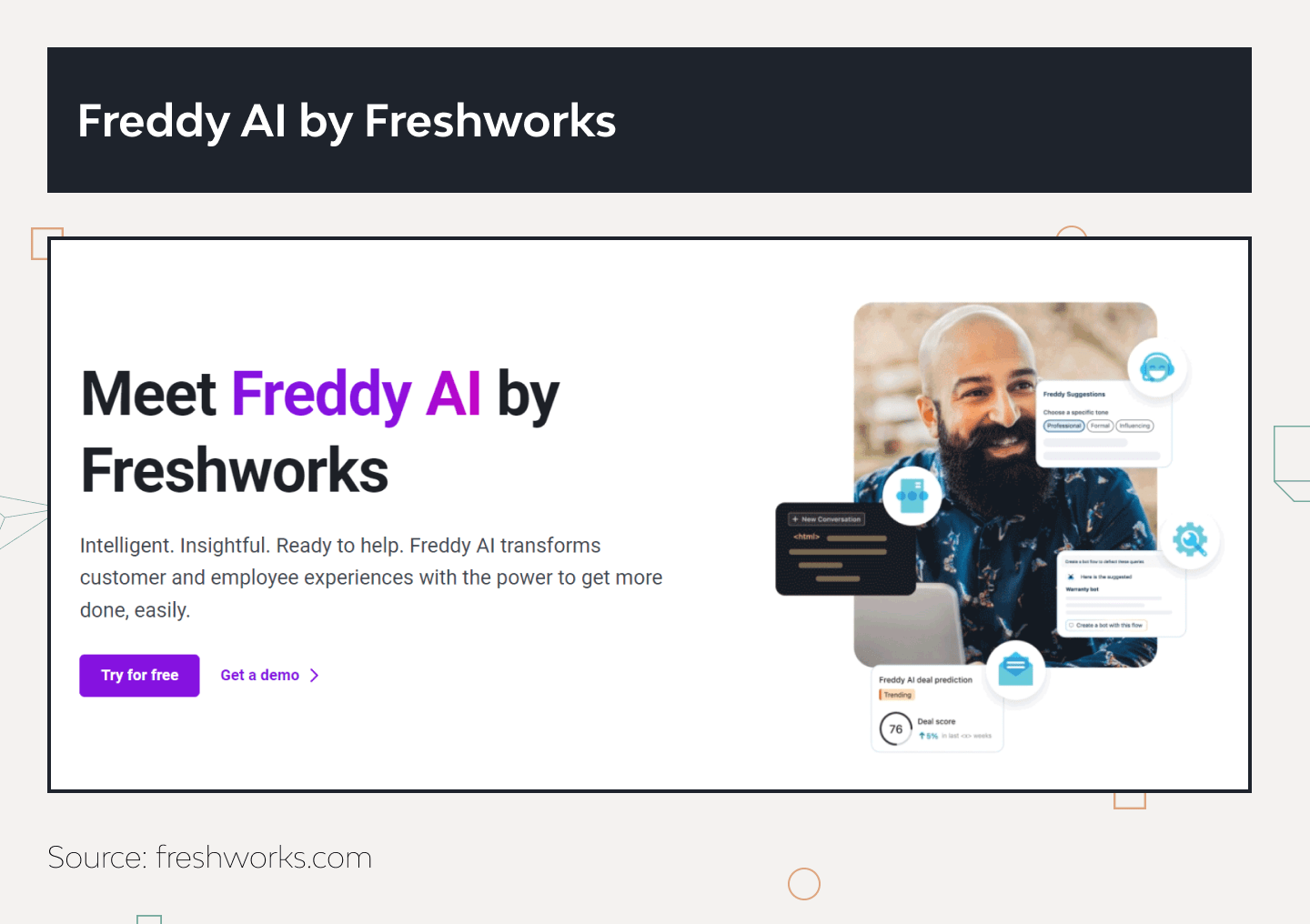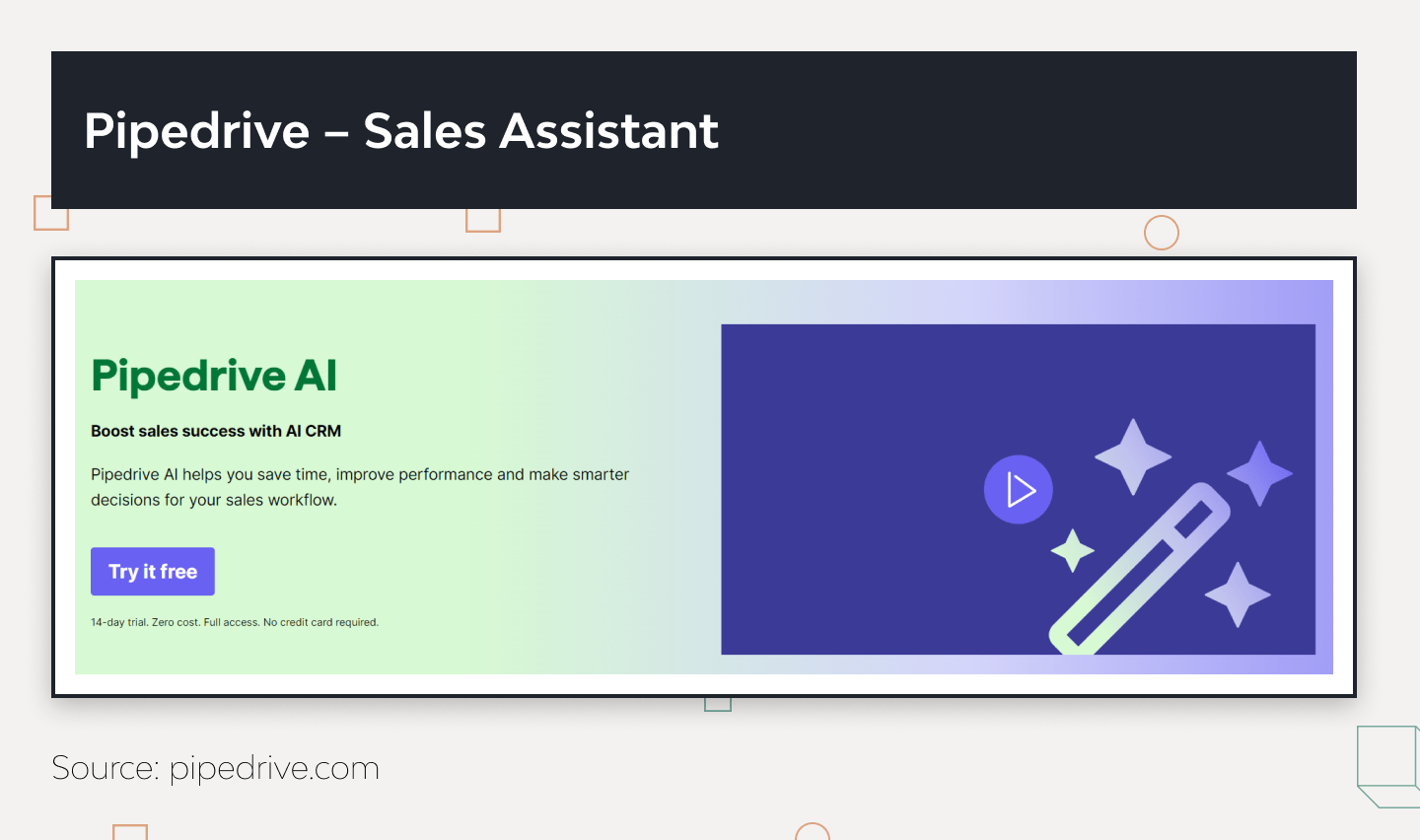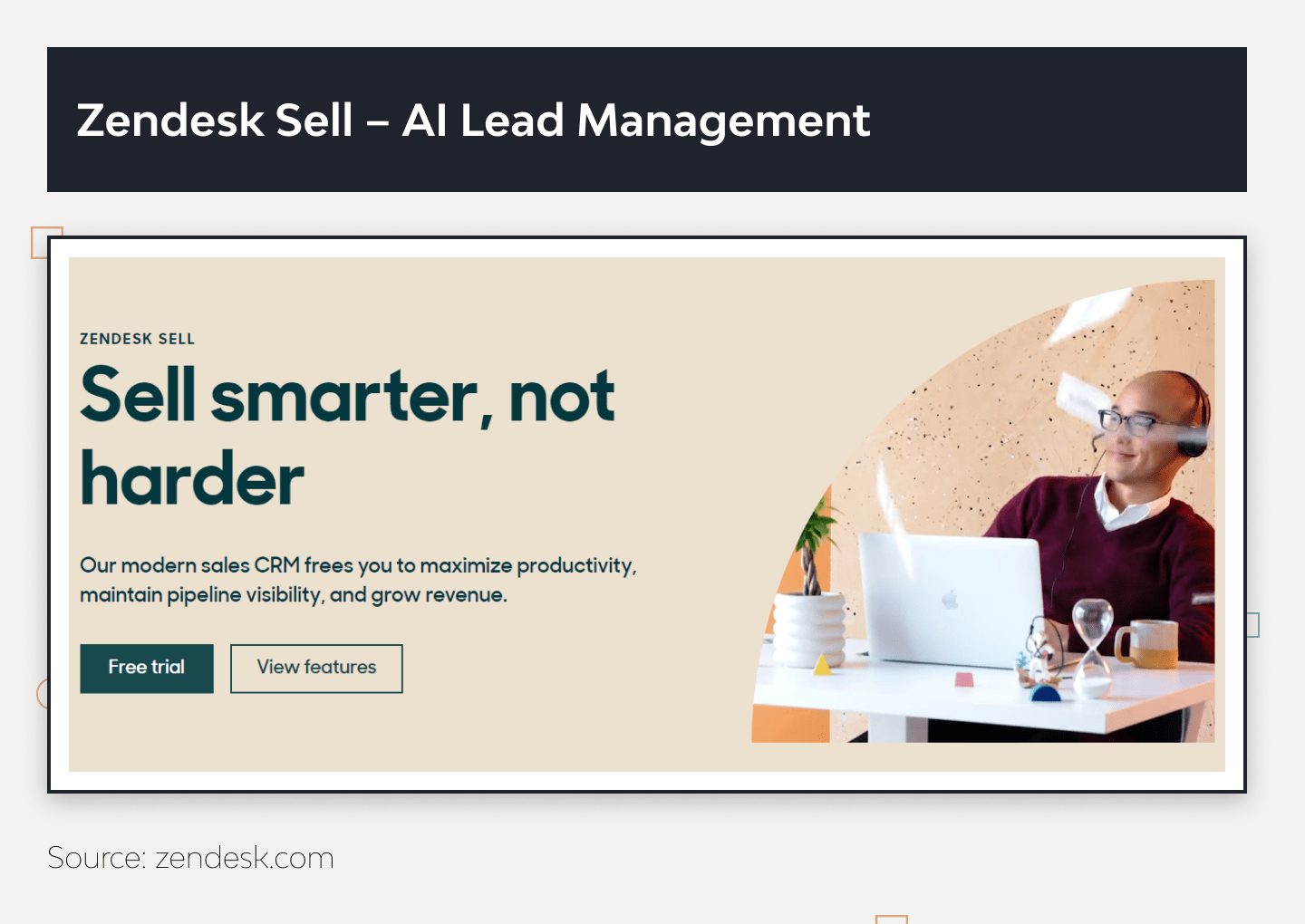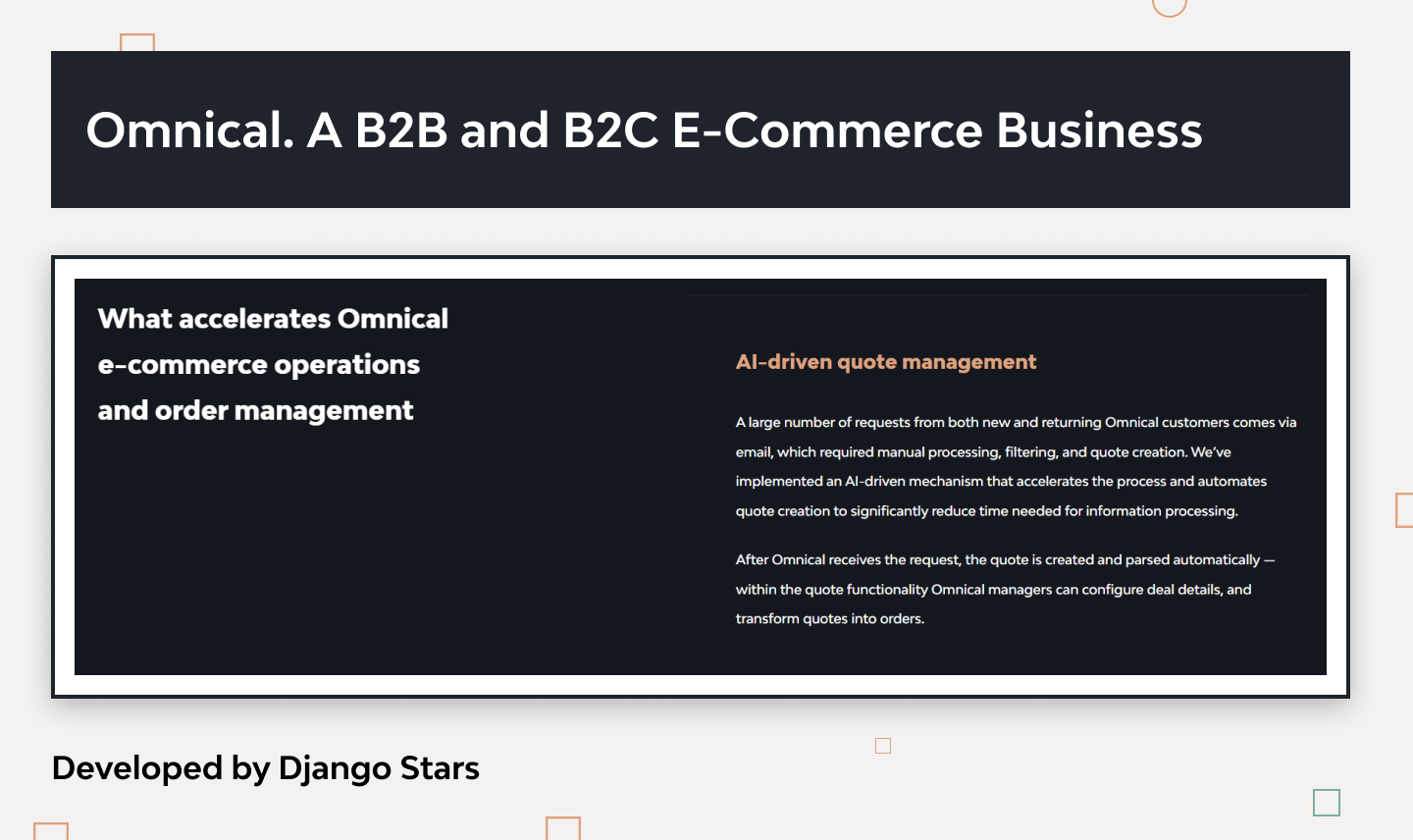Artificial Intelligence in CRM: Benefits, Use Cases and Best Solutions
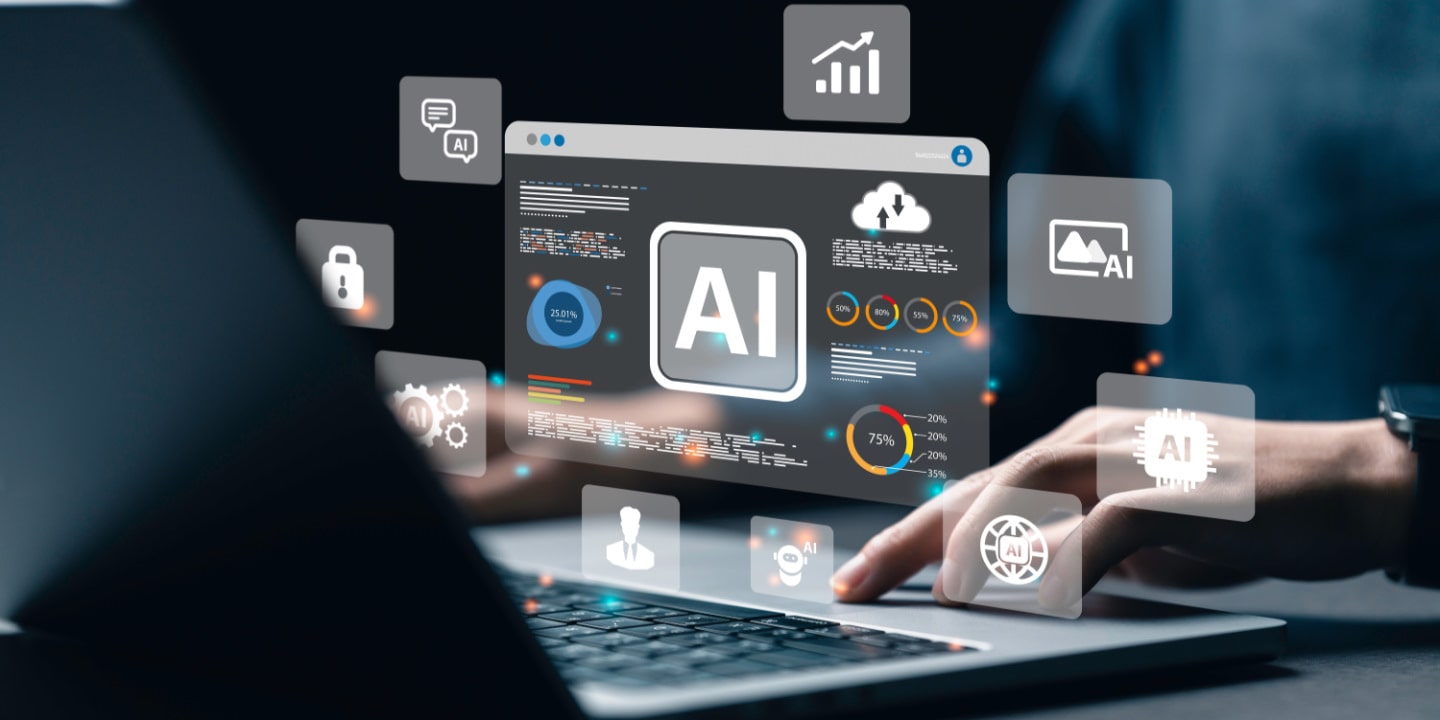
Customer relationship management (CRM) systems are evolving rapidly, driven by the integration of artificial intelligence (AI). CRM with artificial intelligence systems leverage machine learning, natural language processing, and predictive analytics to enhance how businesses interact with customers.
In this blog post, we will explore:
- What AI in CRM means
- How these systems work
- CRM AI use cases
- Transformative benefits of artificial intelligence and CRM
- Case studies by Django Stars
Learn how to leverage AI to improve efficiency, customer satisfaction, and overall business performance. Drawing from my years working in a company providing Django development services to diverse industries like fintech, booking, e-commerce, and more, I’ll share practical insights into how AI can be effectively implemented to drive tangible improvements across various business functions.
What is an AI-powered CRM?
CRM with artificial intelligence refers to systems that automate, optimize, and personalize customer interactions. Traditional CRM systems primarily focus on storing customer data and managing interactions. In contrast, AI-powered CRMs analyze vast amounts of data to provide actionable insights, predict customer behavior, and automate routine tasks.
AI in CRM enhances and personalizes customer interactions, forecasts trends in customer behavior, and bolsters data security. Additionally, the global AI market is expanding, signaling promising opportunities for users of this technology. In 2023, the AI market was valued at $150.2 billion and is expected to surge to $1,345.2 billion by 2030. Furthermore, by the close of 2023, 79% of enterprises will have adopted AI-driven CRM solutions.
How Do AI-Powered CRMs Work?
Modern CRMs often integrate with artificial intelligence ERP systems to streamline end-to-end business processes and ensure seamless data flow between sales, finance, and operations.
Data Analysis and Predictive Analytics
AI algorithms analyze historical customer data to identify patterns and trends. This allows businesses to predict future customer behavior, such as the likelihood of a purchase, potential churn, and preferred communication channels.
Automation of Routine Tasks
AI-powered CRMs automate repetitive tasks such as data entry, email responses, and scheduling follow-ups. Chatbots can handle common customer inquiries, providing instant responses and reducing response times.
Personalization and Customer Insights
AI algorithms segment customers based on their behavior, preferences, and demographics. Personalized interactions lead to higher engagement and conversion rates.
Natural Language Processing (NLP)
NLP enables AI-powered CRMs to understand and interpret human language. This technology powers chatbots, virtual assistants, and sentiment analysis. For example, an AI for CRM can analyze customer sentiment from social media posts and automatically route negative feedback to support teams for immediate action.
Explore our case studies to discover how we’ve implemented AI solutions to achieve real results.
14 Key Benefits of an AI-Powered CRM
AI-powered CRM systems are transforming how businesses manage customer relationships, offering numerous advantages that enhance efficiency, personalization, and strategic decision-making. Here are some of the key artificial intelligence CRM benefits.
1. Handling Increasing Unstructured Data
CRM systems handle vast volumes of customer data from various sources, including emails, social media, and chat logs. AI ML software development services excel at managing unstructured data, leveraging advanced techniques to categorize, analyze, and draw actionable insights.
2. Navigating Complex Processes and Relationships
Customer relationship management involves intricate processes and interactions. AI simplifies these complexities by employing advanced algorithms to identify patterns, predict outcomes, and map customer journeys.
3. Ensuring Clean CRM Data
AI-powered tools automate the cleansing and updating of CRM records, including deduplication, verification, and data enrichment. This ensures data integrity, which is essential for personalized marketing efforts and precise analytics.
4. Creating a Qualified Pipeline
AI enhances lead qualification processes by using predictive analytics to score leads based on their likelihood to convert. This helps sales teams prioritize efforts on the most promising opportunities, refining the sales pipeline and improving conversion rates.
5. I Supercharging Account-Based Marketing (ABM)
AI-driven CRM systems elevate ABM by analyzing detailed account data to tailor marketing and sales strategies for specific high-value accounts. This precision ensures that engagement strategies are highly relevant, increasing the chances of successful interactions and fostering stronger business relationships.
6. Facilitating Data Analysis and Insights
AI transforms CRM systems into powerful data analytics tools capable of processing vast amounts of information to provide deep insights into customer behavior, market trends, and internal performance metrics.
7. Leveraging Predictive Analytics
AI’s predictive capabilities within CRM systems allow businesses to forecast future customer behaviors, purchase likelihood, and potential churn. This proactive approach enables organizations to adjust their strategies, personalize customer interactions, and improve retention rates, enhancing overall customer satisfaction and loyalty.
8. Conducting Sentiment Analysis
AI-powered sentiment analysis interprets the emotional tone behind customer interactions. This understanding helps businesses tailor their communication and services to better meet customer needs, improving overall satisfaction and making the most of every customer interaction.
9. Enhancing Lead Scoring and Nurturing
AI enables more accurate lead scoring and nurturing strategies based on individual lead behavior and preferences. This personalized approach increases the effectiveness of lead conversion efforts, ensuring that sales teams focus on the most promising prospects.
10. Personalizing Customer Experiences
AI in CRM allows for a high degree of personalization, from product recommendations to individualized communication strategies. This personal touch enhances customer engagement and drives loyalty and repeat business as customers feel more connected to the organization.
11. Implementing Chatbots
AI-powered chatbots provide immediate, 24/7 customer support within CRM systems, handling inquiries, guiding customers through processes, and making recommendations. This enhances the overall user experience and reduces the workload for human agents, allowing them to focus on more complex issues.
12. Ensuring Omnichannel Presence
One of the most attractive AI CRM benefits is seamless customer experience across all channels, whether online, in-app, via social media, or in person. This ensures consistent and personalized engagement, improving overall customer satisfaction and brand loyalty.
13. Improving Sales Forecasting and Performance Analysis
AI-driven analytics and forecasting in CRM systems give businesses a clear view of sales trends, team performance, and market opportunities. This leads to more accurate sales forecasting and strategic planning.
14. Predicting Churn and Enhancing Customer Retention
AI and CRM can predict churn risk by analyzing interaction history and customer behavior. This allows businesses to address customer concerns and enhance retention, ensuring that valuable customers remain loyal and engaged.
How are CRMs Using AI: Top Use Cases
AI enhances CRM capabilities to automate tasks, analyze data, and make predictions. Here are the top artificial intelligence and CRM use cases.
Reporting and Predictive Analytics
AI can identify trends, forecast sales, and score leads based on historical data. This empowers organizations to make data-driven decisions, optimize strategies, and anticipate future market movements, leading to better resource allocation and improved business outcomes.
Writing and Email
AI-driven generative text capabilities streamline the creation of emails, presentations, and marketing materials. Integrating AI with CRM email functions enables businesses to draft personalized marketing emails swiftly. This saves time and ensures that the messaging is tailored to each recipient, enhancing engagement and conversion rates.
Automation
It can automate lead management, move prospects through the sales pipeline, and send follow-up emails based on predefined triggers. This reduces manual workload, allowing sales and marketing teams to focus on strategic activities and direct interaction with customers. Automation is becoming crucial across different industry applications, presenting an opportunity to redefine operational efficiencies.
Segmentation
AI’s natural language processing (NLP) capabilities enable more precise segmentation of leads and customers. By analyzing interactions and data, CRM with AI can segment audiences based on behavior, preferences, and demographics. This is especially useful in large industries like real estate and banking where targeted communication is crucial. For businesses in logistics and manufacturing, integrating supply chain generative AI with CRM systems enables even more sophisticated customer segmentation based on supply chain partnerships, vendor relationships, and procurement patterns.
Customer Insights
AI analyzes conversations across various channels (email, chat, phone, video) to gauge customer sentiment and provide insights into their perceptions of products and services. It can also create detailed histories of customer interactions, summarizing key points and identifying trends. This level of insight is invaluable for healthcare or banking services.
Lead Scoring and Qualification
AI enhances lead scoring by evaluating leads based on their behavior, engagement, and conversion likelihood. Predictive models assess the potential value of leads, allowing sales teams to prioritize high-value prospects.
Personalization
AI-driven CRMs offer a high degree of personalization by analyzing customer data and behavior to deliver customized experiences. From personalized product recommendations to individualized marketing messages, AI ensures that interactions are relevant and engaging.
Chatbots and Virtual Assistants
AI-powered chatbots provide instant, 24/7 customer support, handling inquiries, guiding users through processes, and even making product or service recommendations. These virtual assistants reduce response times and free up human agents for more complex tasks.
Sales Forecasting
AI’s predictive analytics capabilities allow for accurate sales forecasting by analyzing historical data and identifying trends. This helps businesses predict future sales, plan inventory, and set realistic targets.
Sentiment Analysis
AI performs sentiment analysis by interpreting the emotional tone of customer interactions. This helps businesses understand customer feelings and attitudes towards their products or services.
Enhancing Customer Retention
AI predicts churn risk by analyzing customer behavior and interaction history. This allows businesses to take proactive measures to retain customers, such as personalized offers or targeted retention campaigns.
Omnichannel Experience
The use of artificial intelligence in CRM systems delivers a consistent and personalized customer experience across all channels. Whether a customer interacts via social media, email, in-app, or in-person, AI ensures that their experience is seamless and tailored to their preferences. Such an opportunity can be crucial for both an established company and a startup aiming to optimize its outreach and customer service operations efficiently across various platforms.
Performance Analysis
AI-driven analytics provide detailed insights into sales team performance, marketing campaign effectiveness, and overall business metrics. These insights enable businesses to identify strengths and areas for improvement, optimize strategies, and achieve better results.
The 6 Best CRMs Using AI
Here are six artificial intelligence in CRM examples and how they empower businesses with advanced capabilities.
Salesforce – Einstein GPT
Salesforce’s Einstein GPT is a generative AI tool that enhances the entire Salesforce ecosystem. It provides AI-generated emails, data insights, and predictive recommendations for sales reps. Additionally, it can route customer service requests based on the customer’s tone, ensuring efficient handling.
Pros:
- Advanced predictive analytics and forecasting
- Personalized recommendations and automation
- Extensive customization and integration options
Cons:
- High cost for advanced features
- Complex setup and learning curve
Pricing: Starting at $50 per user per month, with advanced features priced as add-ons.
HubSpot – ChatSpot
HubSpot’s ChatSpot is one of the best CRM with AI designed to automate tasks for sales, service, and marketing professionals. It can write and send emails, create reports, and generate insights. ChatSpot is currently free and open to everyone with additional benefits to HubSpot customers through CRM integration.
Pros:
- Automatic lead scoring and email optimization
- Versatile chatbots and content recommendations
- Sales forecasting capabilities
Cons:
- Some advanced AI features are only available at higher price tiers
- Occasional unexpected results and incorrect predictions
Pricing: Free for basic use, with more advanced features available in higher-tier plans.
Zoho CRM – Zia
Zoho’s Zia AI is an intelligent assistant embedded in the Zoho CRM ecosystem. Zia offers predictive sales analytics, lead scoring, sentiment analysis, and even assists in content generation. It continuously learns from user interactions, providing improved suggestions and automating more tasks over time.
Pros:
- Comprehensive AI capabilities, including smart sales forecasting and lead scoring
- Conversational AI for real-time assistance
- Automated data enrichment and workflow suggestions
Cons:
- Limited storage on lower-tier plans
- No option for white labeling or re-branding
Pricing: Available across all Zoho CRM plans, starting from $12 per user per month.
Freshsales – Freddy AI
Freshsales, developed by Freshworks, integrates Freddy AI to enhance customer interactions. Freddy AI automates routine tasks, provides predictive insights, and features an AI-powered chatbot for real-time customer engagement. Its ability to access real-time customer data allows for personalized interactions, making each engagement more meaningful.
Pros:
- Affordable compared to competitors
- Multi-language support and built-in telephony
- Powerful AI chatbot tools
Cons:
- Free CRM version does not include AI capabilities
- Fewer integrations compared to larger competitors
Pricing: Starts at $29 per user per month for the basic plan.
Pipedrive – Sales Assistant
Pipedrive’s one of the best AI CRM as it enhances sales processes by analyzing data in real-time and providing actionable next-step suggestions. It also offers performance-based tips, centralized notifications, and progress updates, making it a valuable tool for sales teams.
Pros:
- AI enhances lead capture and data collection
- Centralized notifications and insights
- User-friendly interface and visual sales pipelines
Cons:
- No free version available
- Less comprehensive than larger competitors
Pricing: Starts at $14.90 per user per month.
Zendesk Sell – AI Lead Management
Zendesk Sell combines traditional CRM functionalities with advanced AI capabilities. Its AI-driven lead scoring system prioritizes leads, and automated lead nurturing ensures personalized engagement. Predictive sales forecasting provides insights into potential trends, helping teams strategize effectively.
Pros:
- Centralized customer communications with omnichannel support
- Customer support AI chatbots
- Automated lead nurturing and mobile accessibility
Cons:
- Lacks advanced AI predictive analysis compared to competitors
- Limited email template customization
Pricing: Starts at $19 per user per month.
Ethical Considerations and Challenges of AI in CRM
The increasing adoption of artificial intelligence introduces several challenges of AI in CRM and ethical considerations.
Data Privacy and Security Concerns
Businesses collect vast amounts of customer data for analysis, which necessitates robust privacy measures to ensure that this data is secure and handled responsibly. Companies must implement stringent data protection protocols and adhere to privacy regulations such as GDPR and CCPA. This is increasingly important as the market size for artificial intelligence in CRM continues to expand, presenting more significant data privacy and security challenges.
Key Points:
- Ensure transparency about data usage
- Implement strong encryption and security measures to protect sensitive information
- Prevent data breaches and unauthorized access to maintain customer trust
The 2018 Facebook-Cambridge Analytica scandal underscored the importance of data privacy. This incident highlighted the need for transparency and robust privacy measures in handling customer data.
Algorithmic Bias and Fairness
AI algorithms in CRM systems are susceptible to biases, which can lead to unfair treatment and discrimination against certain groups. Biases can stem from biased training data or inherent flaws in the algorithms themselves.
Key Points:
- Use diverse and representative training data
- Regularly audit algorithms for bias
- Ensure AI decisions are accountable and explainable
Amazon’s AI-powered recruiting tool faced criticism in 2018 for gender bias, as it was trained on historical hiring data that favored male applicants. This incident highlighted the potential for bias in AI-driven systems and the need for ongoing monitoring and adjustment.
Balancing Automation with Human Touch
While best AI CRM can automate many aspects of CRM, it is challenging to balance automation and maintaining a human touch. Customers often value empathetic and personalized interactions that AI alone cannot fully replicate. Chatbot-enabled services can handle routine tasks but should escalate complex issues to human agents.
Key Points:
- Use AI to handle routine tasks and initial customer interactions
- Ensure complex issues can be escalated to human agents
- Provide options for human-assisted support when necessary
Apple’s virtual assistant, Siri, exemplifies this challenge. While Siri provides automated responses and performs tasks, it sometimes frustrates users by failing to understand complex queries.
Transparency and Accountability
AI systems in CRM must operate transparently, with clear accountability for decisions. Customers and regulators need to understand how AI algorithms make decisions, particularly in critical areas like credit scoring or loan approvals.
Key Points:
- Maintain clear documentation of AI decision-making processes
- Provide customers with explanations for AI-driven decisions
- Establish accountability frameworks to address errors or biases in AI outcomes
Ethical Use of Customer Data
The ethical use of customer datais one of the most important challenges of AI in CRM involves respecting user consent and preferences. Businesses must ensure data collection and usage practices align with ethical standards and customer expectations.
Key Points:
- Obtain explicit consent from customers for data collection and usage
- Use customer data only for specified and legitimate purposes
- Allow customers to access, modify, and delete their data
Continuous Monitoring and Adaptation
AI systems require continuous monitoring and adaptation to address evolving ethical challenges and technological advancements. Regular updates and reviews of AI models help maintain their effectiveness and fairness.
Key Points:
- Implement regular reviews and updates of AI algorithms
- Stay informed about advancements in AI ethics and best practices
- Engage with stakeholders, including customers and regulatory bodies, to address concerns and gather feedback
AI-Driven CRM Software Development with Django Stars
Django Stars has become a proficient partner in AI-driven CRM software development. Our experience and expertise have enabled us to transform traditional business operations into highly efficient digital processes. One notable example of our project is Omnical, a B2B and B2C e-commerce business AI based CRM.
Omnical approached Django Stars in the fall of 2022 with a clear vision to digitize and accelerate their order management process, which had been managed manually since 2013. This manual approach, reliant on phone calls and Excel scripts, limited their operational efficiency and growth potential.
The partnership with Omnical was fundamentally aimed at enhancing the operational dynamics. The primary focus was to accelerate communication, significantly improving the speed and efficiency with which Omnical interacts with its clients. Additionally, the partnership sought to revolutionize Omnical’s order management by transitioning from a manual to a fully digitized system.
Solutions Implemented by Django Stars
Custom CRM Development. We designed a custom CRM tailored to Omnical’s business needs. The integrated AI component is small but impactful, and it can pave the way for similar developments in the future.
Automated Quote Generation. CRM with AI-driven mechanism automates the creation and processing of quotes, reducing the time needed for information processing. This system transforms quotes into orders seamlessly.
Enhanced Customer Information Management. Improved customer profiles facilitate faster order processing by utilizing data from previous orders and customer interactions.
Conclusion
AI CRM software enhances data handling, automates routine tasks, and provides deep insights, making them indispensable tools for modern businesses. However, we also face ethical considerations and challenges associated with adopting AI in CRM, emphasizing the importance of data privacy, algorithmic fairness, and maintaining a balance between automation and human touch.
We reviewed some of the best AI-powered CRMs, such as Salesforce Einstein GPT, HubSpot ChatSpot, Zoho Zia, Freshsales Freddy AI, Pipedrive Sales Assistant, and Zendesk Sell. Each of these platforms brings unique AI capabilities that streamline operations, improve customer interactions, and drive business growth.
We also showcased Django Stars’ experience in AI-driven CRM software development through our work with Omnical. This case study demonstrated how Django Stars effectively transforms traditional business processes into efficient, digitalized operations using custom AI solutions.
If you’re looking to leverage AI to enhance your CRM capabilities, Django Stars, as an ai/ml development company, can provide deeper insights and tailored solutions to meet your business needs. Contact the Django Stars team today to explore how their expertise can drive your digital transformation and operational efficiency.
- Should I choose cloud or on-premise CRM with AI features?
- Cloud-based CRMs offer scalability, easier updates, and lower upfront costs. On-premise CRMs provide greater control over data and security.
- Can small businesses also benefit from AI-enhanced CRM solutions?
- Absolutely. AI-enhanced CRM solutions are highly beneficial for small businesses as they automate routine tasks. This leads to increased efficiency, better customer relationships, and higher conversion rates, even with limited resources.
- How much does it cost to implement AI in CRM systems?
- The cost of implementing and use of AI in CRM systems varies based on several factors, including the complexity of the features required, the size of your business, and the chosen CRM platform.
- Which companies use AI in CRM solutions?
- Salesforce with Einstein GPT, HubSpot with ChatSpot, and Zoho with Zia are popular CRMs with artificial intelligence among businesses of all sizes.
- How can AI in CRM improve sales performance?
- AI in CRM can significantly improve sales performance by automating lead scoring, providing predictive analytics, and offering personalized recommendations.

